Flixton Surname Ancestry ResultsOur indexes 1000-1999 include entries for the spelling 'flixton'. In the period you have requested, we have the following 14 records (displaying 1 to 10): Buy all | | | Get all 14 records to view, to save and print for £58.00 |
These sample scans are from the original record. You will get scans of the full pages or articles where the surname you searched for has been found. Your web browser may prevent the sample windows from opening; in this case please change your browser settings to allow pop-up windows from this site. Curia Regis Rolls
(1210-1212)
The Curia Regis, king's court, of mediaeval England took cases from throughout the country, and its records are among the most important surviving from this early period.FLIXTON. Cost: £4.00.  | Sample scan, click to enlarge

| Curia Regis Rolls
(1219-1220)
The Curia Regis, king's court, of mediaeval England took cases from throughout the country, and its records are among the most important surviving from this early period. Rolls 71 and 71B for Michaelmas term of the 3rd and 4th years, and 72 and 73 for Hilary term and Easter term of the 4th year of the reign of king Henry III (Michaelmas 1219 to Easter 1220) were edited by C. T. Flower of the Public Record Office and published in 1938. Each entry is copied in full, the Latin extended from the abbreviated original, the personal and place names given as in the original; where these vary between duplicate rolls, variant spellings are given in the footnotes. The county of each case was marked in the margin in the originals, and this is shown in italics at the start of each entry in the printed edition. FLIXTON. Cost: £4.00.  | Sample scan, click to enlarge

| Clerks and Clergy in Yorkshire, Nottinghamshire, and parts of Lancashire, Westmorland, and Northumberland
(1215-1255)
The register of archbishop Walter Gray of York, containing general diocesan business, mostly relating to clergy. The diocese of York at this period covered all of Yorkshire and Nottinghamshire, as well as Lancashire north of the Ribble, southern Westmorland, and Hexhamshire in Northumberland. The register survives as two rolls (called the Major and the Minor), in all amounting to nearly 71 feet of parchment. It is thought that a third roll or more has been lost, because the acts of the archbishop for the last ten years of his episcopate are missing, as are all the ordination and ecclesiastical discipline records for his reign. The then unpublished parts of the register were edited for the Surtees Society by James Raine and printed in 1870, with some additional material included in appendices.FLIXTON. Cost: £4.00.  | Sample scan, click to enlarge

| Patent Rolls: entries for Lancashire
(1276-1277)
Calendars of the patent rolls of the reign of king Edward I are printed in the Calendars of State Papers: but these cover only a fraction of the material on the rolls. From 1881 to 1889 the reports of the Deputy Keeper of the Public Record Office also include calendars of other material from the rolls - about five times as many entries as in the State Papers - predominantly mandates to the royal justices to hold sessions of oyer and terminer to resolve cases arising locally; but also other general business. The calendar for the 5th year of king Edward I [20 November 1276 to 19 November 1277], hitherto unindexed, is covered here.FLIXTON. Cost: £6.00.  | Sample scan, click to enlarge
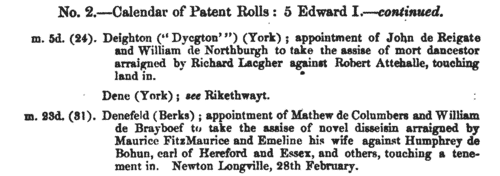
| Yorkshire Inquisitions
(1241-1283)
Inquisitions post mortem are inquiries as to the real estate and heir of each person holding in capite or in chief, i. e. directly, from the Crown, or whose estates had been escheated or were in ward. The age and relationship of the heir are usually recorded. Inquisitions ad quod damnum enquired as to any activities (including maladministration by local officials) that had resulted in any material loss to the Crown. Both sets of inquisitions for this period were edited by William Brown for the Yorkshire Archaeological and Topographical Association, and printed in 1891. This index covers all names mentioned, including jurors, tenants, &c. FLIXTON. Cost: £4.00.  | Sample scan, click to enlarge
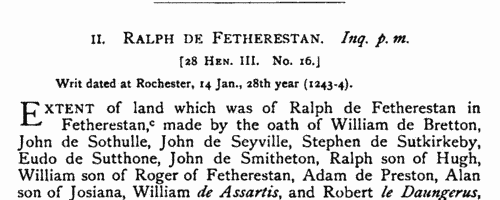
| Lancashire Assizes
(1202-1285)
All the surviving records of the assizes held by the royal justices in eyre (itinerant) in Lancashire during this period were extracted by colonel John Parker and published by the Lancashire and Cheshire Record Society from 1904. The justices not only tried all civil actions outstanding on their advent, pleas of the crown and common pleas, but also interrogated the juries of each wapentake and borough as to the Capitula Itineries, the Articles of the Eyre, inquiring into the king's proprietary rights, escheats, wardships, and questions of maladministration. Only a dozen complete rolls survive for this period; but Appendix I (pp. 218-253) gathers together from the Patent Rolls of the reign of Henry III (1216-1272) a schedule of Lancashire assizes for which justices were assigned; and Appendix II (306-342) adds the fines and amercements before the justices during that reign, as recorded on the Pipe Rolls.FLIXTON. Cost: £4.00.  | Sample scan, click to enlarge

| Yorkshire Inquisitions
(1275-1295)
Inquisitions post mortem are inquiries as to the real estate and heir of each person holding in capite or in chief, i. e. directly, from the Crown, or whose estates had been escheated or were in ward. The age and relationship of the heir are usually recorded. Inquisitions ad quod damnum enquired as to any activities (including maladministration by local officials) that had resulted in any material loss to the Crown. Proofs of age are inquiries into the precise date of birth of an heir, usually involving local inhabitants recalling those circumstances which fixed that date in their mind. Yorkshire inquisitions for this period were edited by William Brown for the Yorkshire Archaeological Society, and printed in 1898. This index covers all names mentioned, including jurors, tenants, &c. FLIXTON. Cost: £4.00.  | Sample scan, click to enlarge
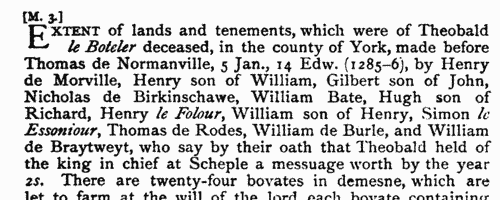
| Inhabitants of Yorkshire
(1297)
Taxation roll of the lay (non-clergy) inhabitants of Yorkshire from the 25th year of the reign of king Edward I. LatinFLIXTON. Cost: £6.00.  | Sample scan, click to enlarge
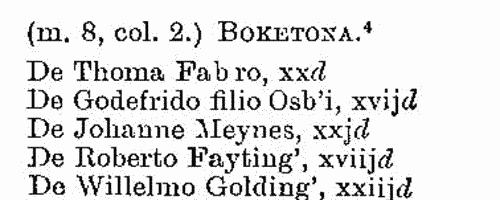
| Yorkshire Inquisitions
(1294-1303)
Inquisitions post mortem are inquiries as to the real estate and heir of each person holding in capite or in chief, i. e. directly, from the Crown, or whose estates had been escheated or were in ward. The age and relationship of the heir are usually recorded. Inquisitions ad quod damnum enquired as to any activities (including maladministration by local officials) that had resulted in any material loss to the Crown. Proofs of age are inquiries into the precise date of birth of an heir, usually involving local inhabitants recalling those circumstances which fixed that date in their mind. Yorkshire inquisitions for this period were edited by William Brown for the Yorkshire Archaeological Society, and printed in 1902. This index covers all names mentioned, including jurors, tenants, &c. The volume also includes two stray inquests, from 1245 and 1282.FLIXTON. Cost: £4.00.  | Sample scan, click to enlarge
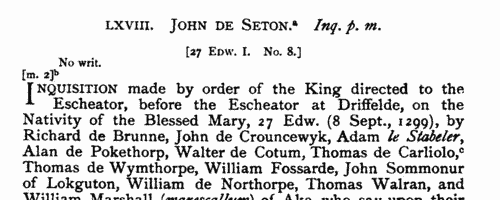
| Close Rolls
(1333-1337)
The close rolls of the 7th to 10th years of the reign of king Edward III, that is from 25 January 1333 to 24 January 1337, record the main artery of government administration in England, the orders sent out day by day to individual officers, especially sheriffs of shires: they are an exceptionally rich source for so early a period. In amongst this official material, the rolls were also used as a way of recording many acknowledgments of private debts and contracts between individuals. Most of the contents relate to England, but there are also entries concerning Wales, Scotland, Ireland and the English possessions in France: particularly Scotland, where the king was campaigning during this period. This calendar was prepared by A. B. Hinds of the Public Record Office and published in 1898.FLIXTON. Cost: £4.00.  | Sample scan, click to enlarge

|
| 1 | 2 |  |
Research your ancestry, family history, genealogy and one-name study by direct access to original records and archives indexed by surname.
|












